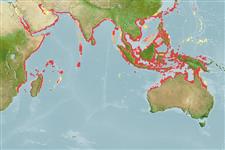Environment: milieu / climate zone / depth range / distribution range
Ecology
Marine; freshwater; brackish; demersal; anadromous (Ref. 51243); depth range 15 - 20 m (Ref. 11790). Tropical; 31°N - 23°S, 33°E - 149°E
Indo-West Pacific: Red Sea and Persian Gulf, then off the west coast of India and Sri Lanka, eastward through the Malay Peninsula and Archipelago to China and northern Australia. Recorded from the mouth of Vivany River in Madagascar (Ref. 6805).
Size / Weight / Age
Maturity: Lm ? range ? - ? cm
Max length : 38.0 cm TL male/unsexed; (Ref. 116549); common length : 12.0 cm TL male/unsexed; (Ref. 3505); max. published weight: 600.00 g (Ref. 116549)
Inhabits shallow sand and mud bottoms in coastal waters. Enters brackish waters (Ref. 6805). Reported to enter fresh waters (Ref. 4833). Feeds mainly on bottom-dwelling invertebrates, especially small crustaceans (Ref. 30573). Marketed fresh, frozen and dried salted.
Life cycle and mating behavior
Maturities | Reproduction | Spawnings | Egg(s) | Fecundities | Larvae
Munroe, T.A., 2001. Soleidae. Soles. p. 3878-3889. In K.E. Carpenter and V. Niem (eds.) FAO species identification guide for fishery purposes. The living marine resources of the Western Central Pacific. Vol. 6. Bony fishes part 4 (Labridae to Latimeriidae), estuarine crocodiles. FAO, Rome. (Ref. 9893)
IUCN Red List Status (Ref. 130435)
Threat to humans
Harmless
Human uses
Fisheries: commercial
Tools
Special reports
Download XML
Internet sources
Estimates based on models
Preferred temperature (Ref.
123201): 25.6 - 29.2, mean 28.5 °C (based on 2132 cells).
Phylogenetic diversity index (Ref.
82804): PD
50 = 0.5000 [Uniqueness, from 0.5 = low to 2.0 = high].
Bayesian length-weight: a=0.00851 (0.00528 - 0.01373), b=3.03 (2.89 - 3.17), in cm total length, based on LWR estimates for this species & (Sub)family-body (Ref.
93245).
Trophic level (Ref.
69278): 3.5 ±0.37 se; based on food items.
Generation time: 5.5 ( na - na) years. Estimated as median ln(3)/K based on 1
growth studies.
Resilience (Ref.
120179): Medium, minimum population doubling time 1.4 - 4.4 years (Preliminary K or Fecundity.).
Fishing Vulnerability (Ref.
59153): Moderate vulnerability (40 of 100).
Nutrients (Ref.
124155): Calcium = 289 [65, 699] mg/100g; Iron = 0.988 [0.396, 2.560] mg/100g; Protein = 18 [16, 20] %; Omega3 = 0.104 [0.046, 0.211] g/100g; Selenium = 39.5 [18.1, 86.4] μg/100g; VitaminA = 16.4 [5.2, 51.5] μg/100g; Zinc = 1.47 [0.68, 2.96] mg/100g (wet weight);
